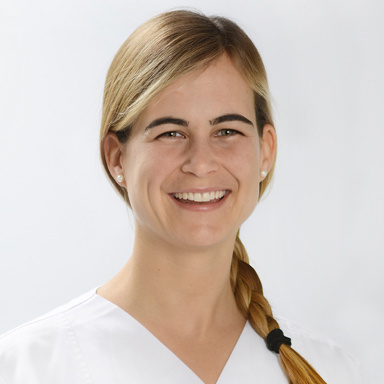Dr. med. Patrizia Sager

Dr. med. Patrizia Sager, Specialist in Gynaecology and Obstetrics, Head of the Bern Biel Breast Centre
What exactly drew you to this job?
I have always wanted to provide breast cancer patients with high-quality, holistic treatment. This can only be achieved if specialists also work together to define the best treatment for each individual patient. Such collaboration can only be successful in a breast centre where everyone pursues the same goal.
What do you enjoy most about your job?
Close, personalised care of patients, which includes several steps from diagnosis to treatment. This establishes a close bond. In addition, we work at a high level and hold lively interdisciplinary discussions with one another.
Do you remember a specific patient history?
I have cared for a very young patient who was diagnosed with breast cancer at the age of 27. She had a hard time with chemotherapy and surgery, and was about to get married. We had many discussions about her future. Now, 6 years later, she has a 2-year-old daughter and is living a normal life once again.
Prof. Dr. med. Maziar Shafighi
Prof. Dr. med. Maziar Shafighi, Specialist in Plastic, Reconstructive and Cosmetic Surgery, Breast Centre Bern Biel
What exactly drew you to this job?
The versatility of my profession, the craftsmanship and the possibility of restoring an organ like the breast and thus helping a patient to regain her normal self-esteem and a good quality of life after this difficult time are still fascinating and the reasons why I love my work.
What do you enjoy most about your job?
It is a privilege for me to be able to pursue my passion in this profession. Symbolically speaking, I see myself and breast reconstruction for patients as a bridge between the shock diagnosis of breast cancer and their return to normal life.
Do you remember a specific patient history?
A 65-year-old female patient, whose breast I reconstructed with autologous tissue from the abdominal region about 20 years after the breast removal, told me that she was very grateful that such a thing is even possible. If she had known about these options at that time, she would have had this operation much earlier and had a better quality of life all these years.

Breast Care Nurse



Marion Vogel, Jasmina Vekic and Tanja Eschmann, Breast care nurses
What advice do you have for women regarding breast cancer prevention?
Breast cancer is the most common type of cancer in women and affects every age group. I think women should learn to self-examine from their teenage years so they develop a feeling for their own breasts and notice changes more readily In later life, screening is important to detect breast cancer as early as possible, to minimise the formation of metastases or to treat it in the best way.
As a breast care nurse, how can you help women affected by breast cancer?
Studies show that counselling and support play an extremely valuable and helpful role in the fight against cancer, alongside the work of the medical treatment team. As breast care nurses, we actively listen, provide assistance, try to give our patients space and time to process what is happening to them, provide addresses, act as contact persons, and support them from the time they are diagnosed through to the end of their treatment.
What has been your most moving encounter with a patient so far?
We breast care nurses never fail to be moved by the will to live that slowly manifests in those affected, and how they take each day as it comes and cope with the difficult time.
What has been the most beautiful success story for you to date?
We view every story as a success story, because everyone who is affected by breast disease fights, battles through hardship, and is forced to get to know themselves and their surroundings anew and find their way back to a normal life. Everyone who manages to do this has in essence written a success story.
How do you deal with the fact that some patients have a bad prognosis?
In our profession, there are always diagnoses that hit closer to home than others, be it because they are particularly difficult, linked to a personal story, or because we form a bond with the person affected. At the Bern Biel Breast Centre, there is always room to talk about such feelings, and we are encouraged to exchange experiences so that we can always work empathetically and professionally.
PD Dr. med. Meike Körner
PD Dr. med. Meike Körner, Specialist in Pathology
As a specialist in pathology, how can you help women affected by breast cancer?
By providing a pathology report quickly, so that those affected do not have to wait overly long until they receive definitive clarity about the diagnosis. And by always striving to offer high-quality pathological examinations, so that the optimum treatment can be chosen for each patient.

